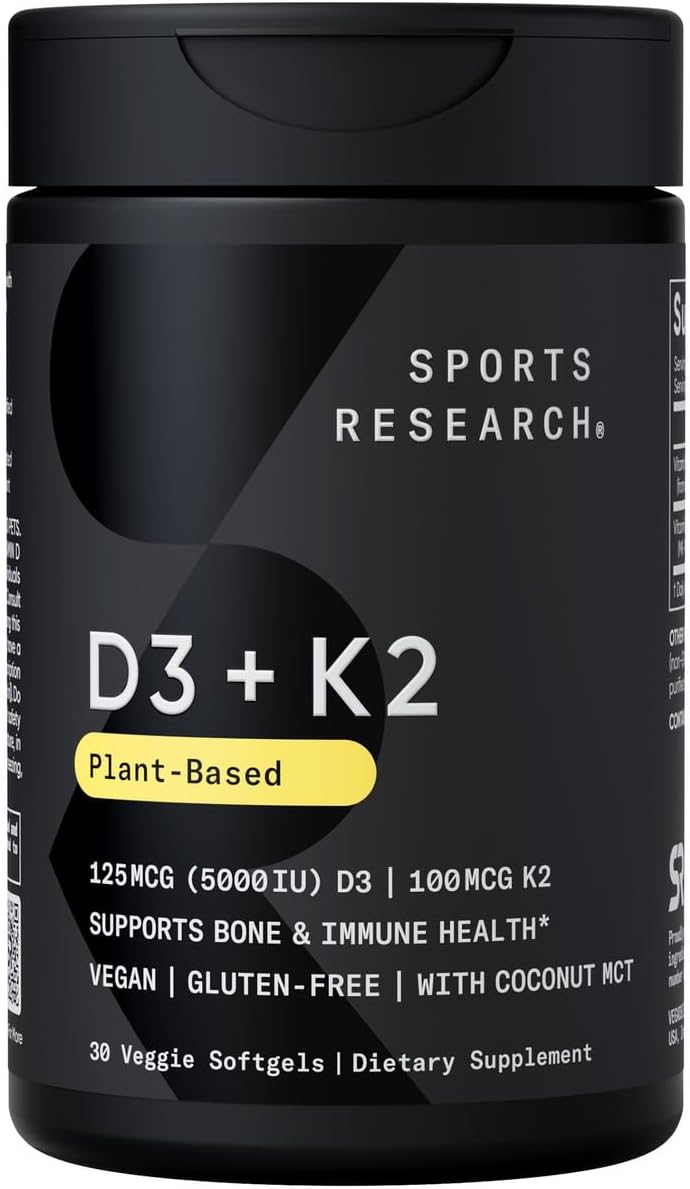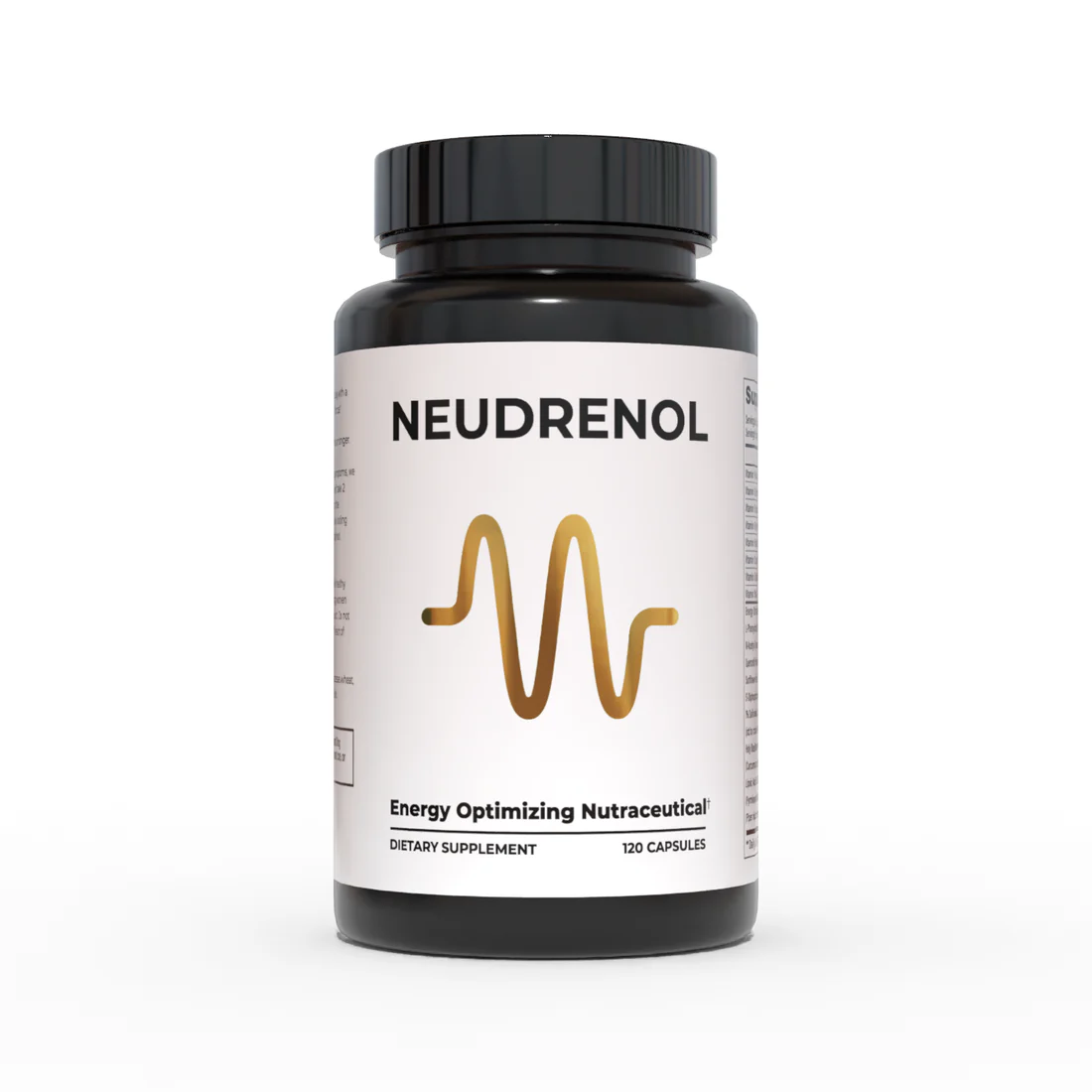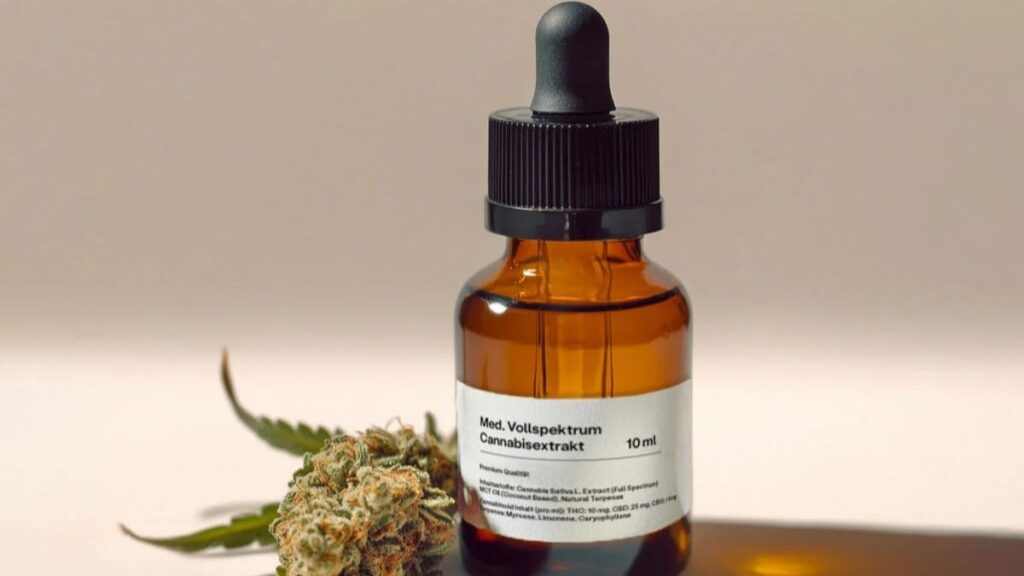Modern lifestyles—long hours indoors, sunscreen use, and limited dietary sources—often leave many of us deficient in vitamin D3, the sunshine vitamin critical for calcium absorption and immune support. Without adequate D3, bones become brittle, mood dips, and immune defenses weaken. Yet simply taking D3 alone isn’t enough: without vitamin K2 guiding calcium to bones instead of soft tissues, you risk arterial calcification and diminished bone mineralization. Common multivitamins contain generic K1 rather than the more bioactive K2 (as MK-7), leaving a vital partnership unaddressed.
In this article, you’ll learn how Sports Research D3 + K2 Plant-Based bridges this nutritional gap by combining high-potency, vegan-friendly D3 (sourced from lichen) with certified vegan K2 (as menaquinone-7). You’ll discover why these two fat-soluble vitamins work in tandem for optimal bone density, cardiovascular health, and immune function; practical dosing recommendations; and how to incorporate them into your daily routine—empowering you to thrive with strong bones and a healthy heart.
Shop Sports Research D3 + K2 Plant-Based
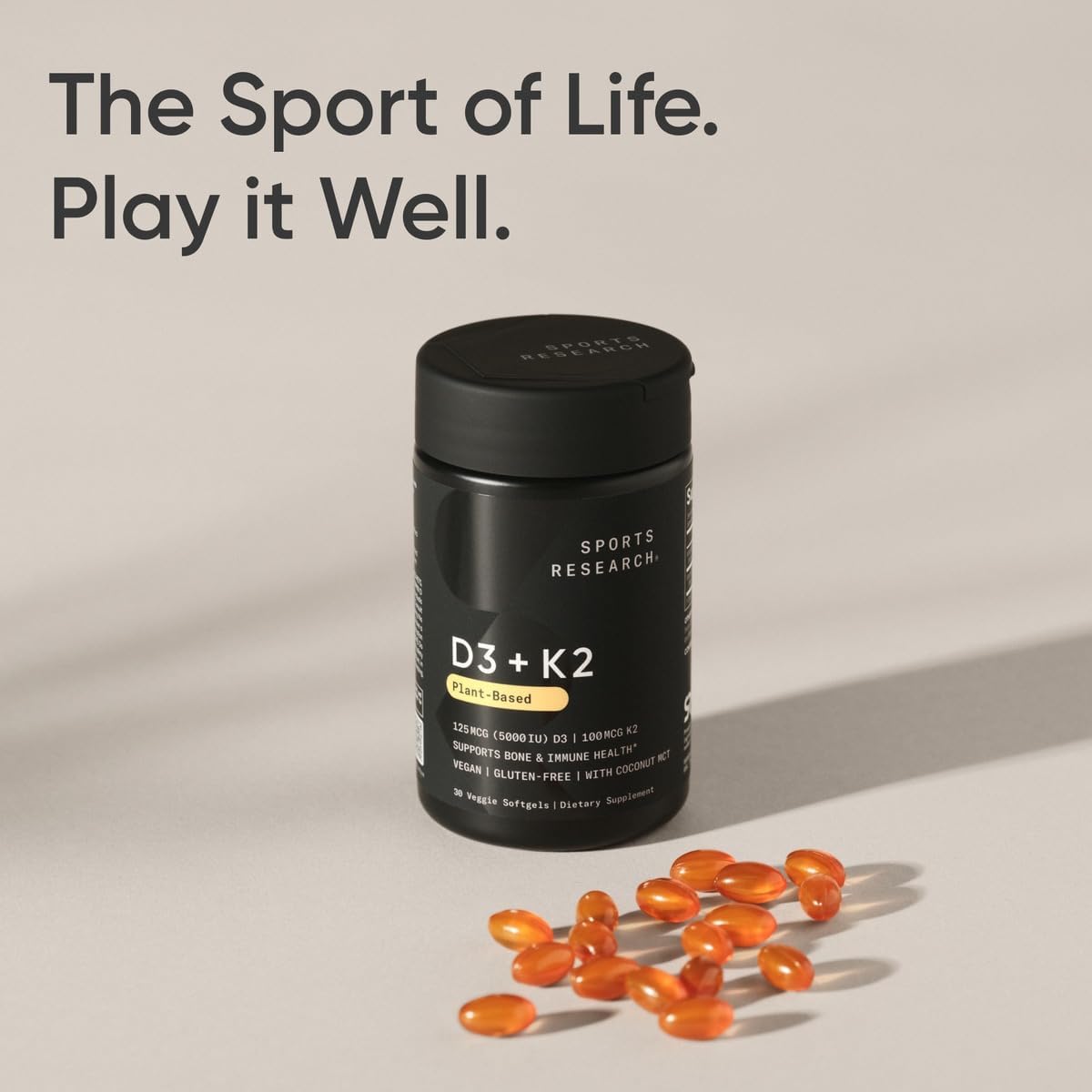
The Crucial Symbiosis of D3 and K2
Vitamin D3 (cholecalciferol) regulates serum calcium levels, promoting its absorption from the gut and enabling proper bone mineralization. However, vitamin K2 (menaquinone-7, MK-7) acts as a traffic director—activating osteocalcin, a protein that binds calcium to the bone matrix, and matrix Gla protein (MGP), which prevents calcium deposits in arteries. Without sufficient K2, supplemental D3 can inadvertently increase vascular calcification risk. This D3 + K2 synergy ensures calcium goes where it belongs—fortifying bones and preventing arterial stiffening that can lead to cardiovascular disease.
Why Plant-Based Sources Matter
Traditional D3 supplements derive from lanolin (sheep’s wool), unsuitable for vegans. K2 (MK-7) often comes from fermented natto—a soy-based source that appeals to vegetarians but may contain traces of soy proteins or GMOs. Sports Research prioritizes a fully plant-based, hypoallergenic approach: their D3 originates from sustainably harvested lichen, and K2 (MK-7) is extracted from chickpea fermentation—eliminating soy, dairy, and animal byproducts. Each formula is Non-GMO Project Verified and Certified Vegan by Vegan Action, ensuring purity and ethical sourcing.
Formulation Highlights & Dosage Guidance
Each softgel delivers:
- Vitamin D3 (5,000 IU / 125 mcg): In line with Endocrine Society recommendations for individuals with low baseline levels or limited sun exposure.
- Vitamin K2 (MK-7, 100 mcg): Maintains active osteocalcin levels and supports optimal calcium utilization.
Why 5,000 IU of D3?
While the RDA for adults is 600–800 IU, many experts advocate for 2,000–5,000 IU daily to reach serum 25(OH)D levels above 30 ng/mL—especially in higher latitudes, winter months, or for those with darker skin. Clinical studies show that 5,000 IU daily consistently brings deficient individuals into the optimal range without toxicity when paired with K2 to manage calcium distribution.
The Impact of MK-7 over MK-4
MK-7 offers a longer half-life (around 72 hours) compared to MK-4 (roughly 1–2 hours), providing sustained vitamin K activity. This steady presence supports continuous carboxylation of osteocalcin and MGP—maximizing bone and cardiovascular benefits with just one daily softgel.
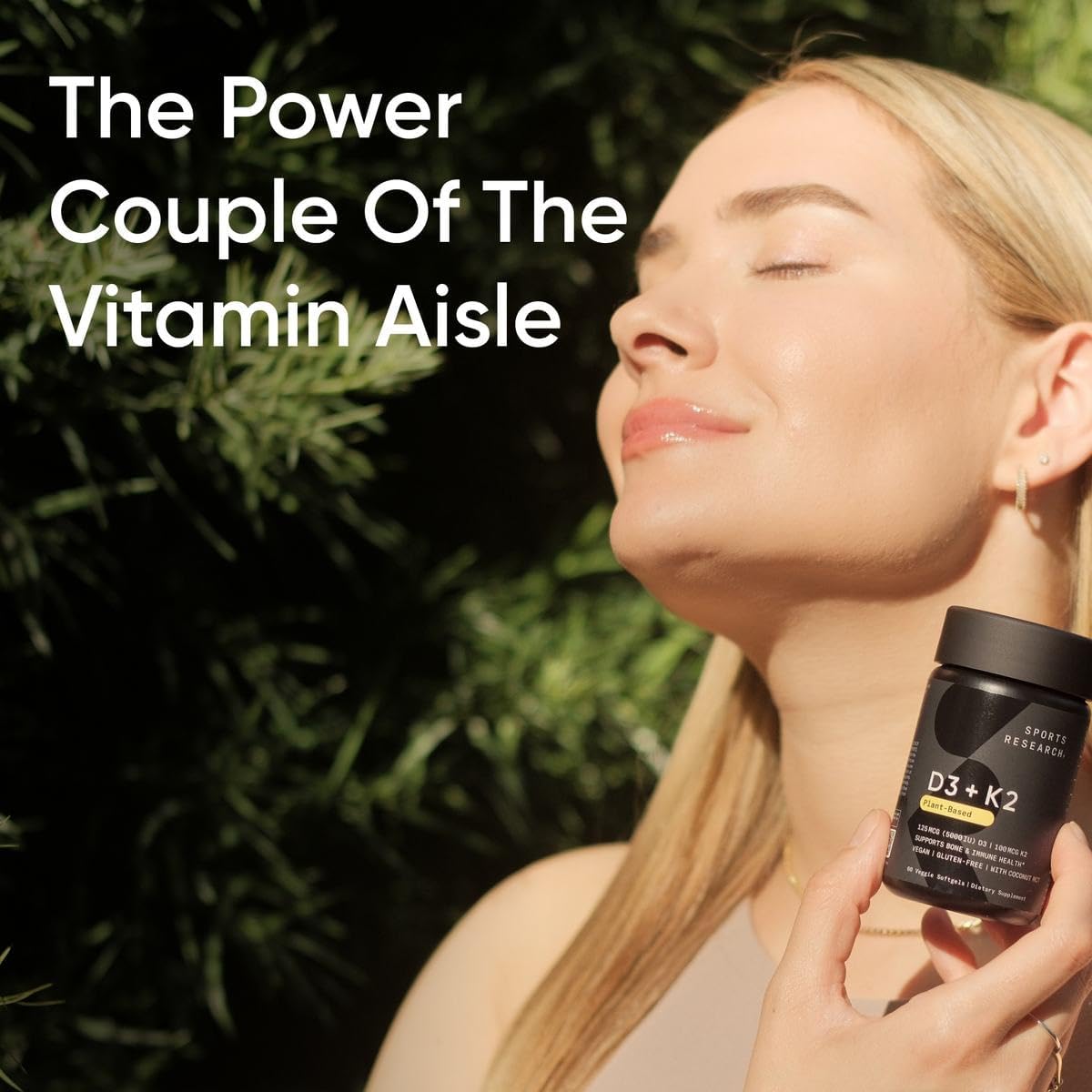
Integrating into Daily Routine
For most adults, one softgel per day with a meal containing healthy fats (avocado, olive oil, nuts) ensures optimal absorption—since D3 and K2 are fat-soluble vitamins. Ideal times include breakfast or lunch when you consume oils or rich foods. Here are practical tips:
- Morning Meal Pairing: Add to your breakfast smoothie bowl (topped with nuts and seeds) or alongside scrambled eggs cooked in olive oil.
- Workout Day Routine: Take before or after resistance training to support muscle recovery (vitamin D modulates muscle protein synthesis) and prepare bones for impact.
- Winter Months Emphasis: Increase consistency during fall and winter when sun-derived D3 synthesis plummets—ensuring serum levels remain stable year-round.
Serum testing every 3–6 months helps monitor 25(OH)D concentrations. If your levels exceed 50 ng/mL, consult a healthcare provider to adjust dosage accordingly. The K2 dose (100 mcg) need not change unless advised, as MK-7’s safety profile extends well beyond 100 mcg.
Multifaceted Health Benefits Beyond Bones
While bone density and arterial flexibility headline the benefits, D3 + K2 deliver additional systemic advantages:
- Immune System Modulation: Vitamin D3 regulates innate and adaptive immunity, reducing susceptibility to respiratory infections and supporting cytokine balance—crucial during cold seasons or high-stress periods.
- Mood and Cognitive Resilience: Low D3 levels associate with seasonal affective disorder (SAD) and mood imbalances. By maintaining optimal levels, you may experience improved mood stability, mental clarity, and reduced depressive symptoms.
- Cardiometabolic Health: Activated MGP (via K2) inhibits vascular smooth muscle calcification, preserving arterial elasticity. Clinical trials link adequate K2 intake to lower incidence of coronary artery calcification, reduced risk of peripheral arterial disease, and improved insulin sensitivity.
- Hormonal Balance and Fertility: Emerging research suggests D3 modulates sex hormones and ovarian function. Achieving sufficient D3 may support healthy reproductive outcomes and regulate testosterone levels in men.
By covering these overlapping health pillars, Sports Research D3 + K2 becomes a cornerstone supplement for holistic wellness.
Shop Sports Research D3 + K2 Plant-Based
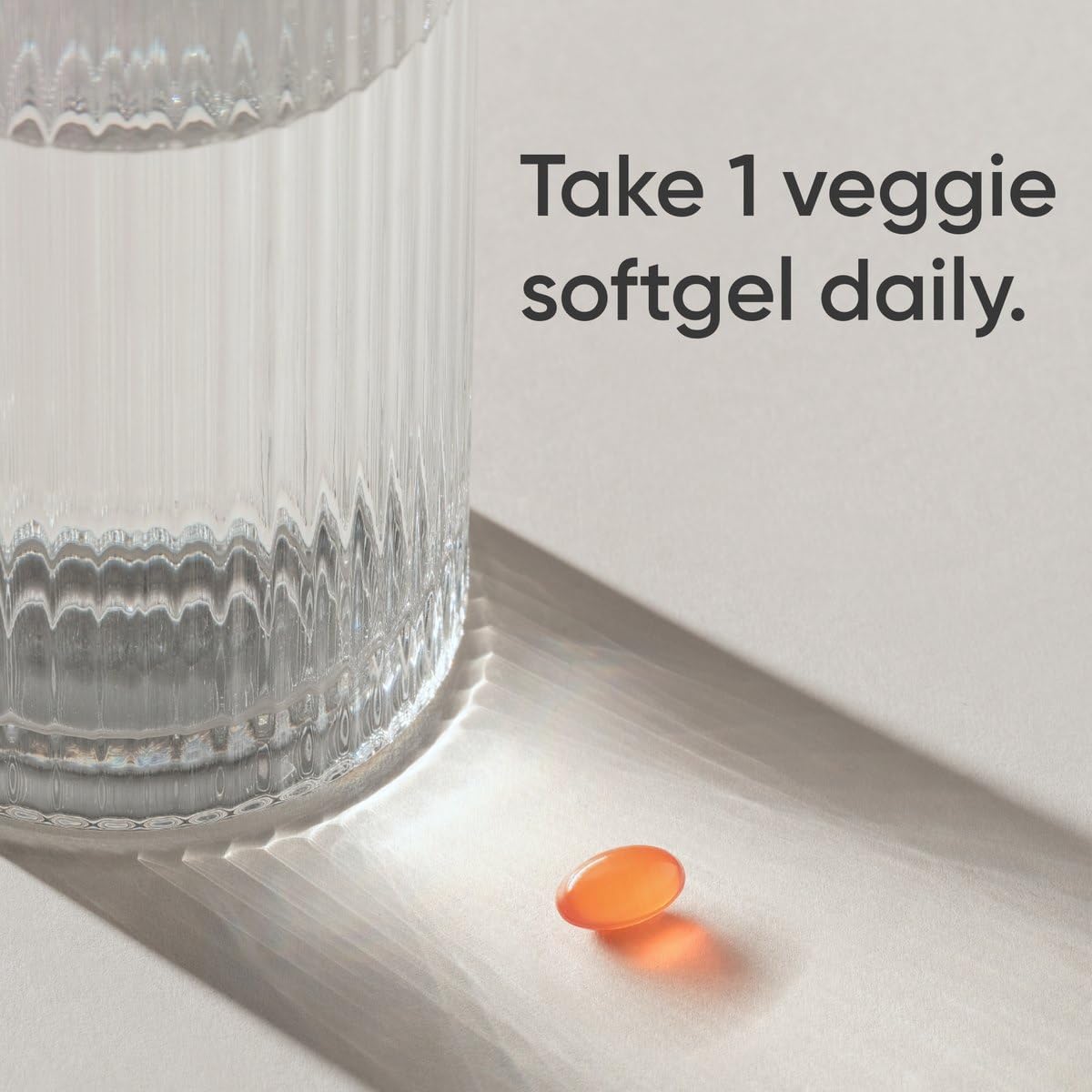
Potential Interactions and Safety Considerations
While safe for most adults, recognize a few points:
- Blood-Thinning Medications: Vitamin K2 can interfere with warfarin (Coumadin) therapy. If you’re on anticoagulants, maintain consistent K intake and consult your physician before starting D3 + K2.
- Calcium Supplements: When you combine high-dose D3 + K2 with large calcium intakes, monitor serum calcium and kidney function regularly—particularly for individuals with hyperparathyroidism or kidney disease.
- Allergies and Sensitivities: This formula is free of gluten, soy, dairy, and nuts. However, if you have a history of rare lichen or chickpea allergies, verify with your healthcare provider before use.
- Exceeding Recommended Dosages: Vitamin D toxicity (hypercalcemia) usually arises from chronic doses above 10,000 IU daily without medical supervision. The D3 (5,000 IU) + K2 (100 mcg) ratio in this product remains within safe, efficacious ranges for healthy adults.
Comparing to Other D3 + K2 Supplements
Not all D3 + K2 formulations are equal. Key differentiators of Sports Research include:
- Plant-Based Sourcing: Many competitors use lanolin-derived D3 and synthetic MK-7; Sports Research’s lichen-derived D3 and chickpea-based MK-7 ensure truly vegan profiles.
- Clinically Relevant Ratios: The 50:1 IU-to-mcg ratio (5,000 IU D3 : 100 mcg MK-7) aligns with published clinical studies showing bone density improvement and cardiovascular protection—whereas lesser ratios (e.g., 1,000 IU : 45 mcg) may underdeliver.
- Third-Party Verification: NSF Certified for Sport and Informed-Sport tested, this product undergoes rigorous testing for banned substances and purity—crucial for athletes or anyone requiring clean-label assurances.
- Softgel Bioavailability: Utilizing sunflower oil as a carrier, the softgel ensures high bioavailability. Some liquid spray D3 forms or K2 tablets lack this optimized delivery system, reducing absorption efficiency.
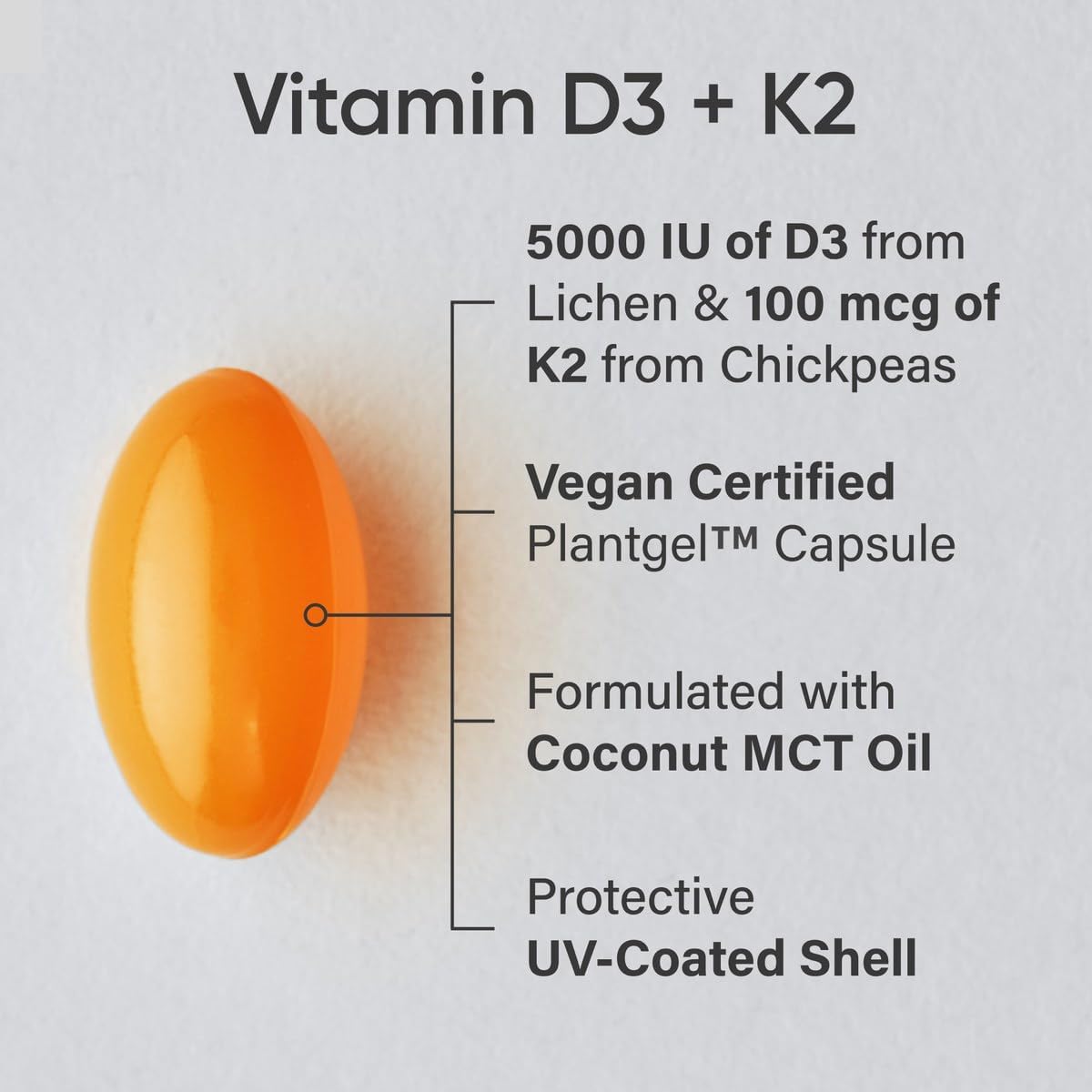
Conclusion
Optimizing your vitamin D3 + K2 intake is essential for stronger bones, flexible arteries, robust immunity, and balanced mood. Sports Research D3 + K2 Plant-Based delivers a potent, vegan-friendly combination—leveraging lichen-derived D3 and chickpea-fermented MK-7 to ensure maximal absorption and clinically supported dosage ratios. By incorporating one softgel daily with food, you provide your body the nutritional synergy required to direct calcium precisely where it’s needed—fortifying bone matrix while preventing arterial calcification. Whether you’re an athlete seeking joint resilience, an adult battling seasonal mood slumps, or simply someone who wants comprehensive wellness support, this D3 + K2 formula is a foundational supplement that powers healthier, more vibrant living.
Shop Sports Research D3 + K2 Plant-Based
FAQ
- How much vitamin D3 do I need daily if I live in a northern climate?
If you have minimal sun exposure—especially during fall and winter—many healthcare providers recommend 2,000–5,000 IU of D3 daily. For personalized dosing, have your serum 25(OH)D level checked; aim for 30–50 ng/mL. Sports Research’s 5,000 IU dosage helps most deficient individuals achieve optimal range when taken consistently. - Why is vitamin K2 (MK-7) superior to vitamin K1?
Vitamin K1 (phylloquinone) primarily functions in liver-based clotting factor activation. K2 (menaquinone) circulates longer and specifically activates osteocalcin (for bone mineralization) and matrix Gla protein (for vascular health). MK-7’s 3-day half-life ensures more stable blood levels than MK-4 or K1. - Can I take D3 + K2 if I’m already on a multivitamin with vitamin D?
Yes—provided your multivitamin’s total D3 dose is under 2,000 IU. If your multivitamin alone provides fewer than 2,000 IU, adding Sports Research’s D3 + K2 can help you reach 5,000 IU total. Be careful not to exceed 10,000 IU without medical oversight. Always track total daily intake from all sources. - When should I take D3 + K2 for best absorption?
Take with a meal containing healthy fats—breakfast or lunch tends to work well. Fat-soluble vitamins absorb more efficiently with dietary fat. Studies show taking D3 in the morning helps avoid sleep disruptions sometimes reported when taken at night. - How quickly can I expect to see bone density improvements?
Clinical trials show measurable improvements in bone mineral density after 6–12 months of consistent D3 + K2 supplementation combined with adequate calcium and weight-bearing exercise. Expect subtle joint comfort improvements within 4–6 weeks and bone changes over a year. - Is there any difference between MK-7 from chickpea versus natto?
Both sources yield high-purity MK-7, but chickpea-derived MK-7 appeals to those with soy sensitivities or who avoid fermented soy products. Nutritionally, MK-7’s activity—measured by its half-life and ability to carboxylate osteocalcin—matches natto-derived MK-7 when properly extracted. - Can I take D3 + K2 with osteoporosis medications?
Generally, yes, but always consult your endocrinologist or primary care doctor, especially if on bisphosphonates (e.g., alendronate) or parathyroid hormone analogs. D3 + K2 complement prescription therapies by enhancing bone matrix formation; however, dosing should be coordinated to avoid hypercalcemia. - Does D3 + K2 help prevent heart disease?
Observational studies link higher vitamin K2 intake to reduced coronary artery calcification and lower cardiovascular mortality. When K2 activates MGP, it prevents calcium from depositing in arterial walls. Complemented by adequate D3, this synergy supports heart health—though lifestyle factors (diet, exercise) remain paramount. - What happens if I take D3 without K2?
Supplementing D3 alone increases calcium absorption but, without sufficient K2, can lead to suboptimal calcium routing—potentially raising arterial calcification risk over time. To ensure calcium goes to bone rather than soft tissue, pairing D3 and K2 is strongly recommended. - Are there any adverse effects of taking 5,000 IU D3 daily?
Most healthy adults tolerate 5,000 IU of D3 daily well. However, if you already have elevated serum calcium, granulomatous diseases (e.g., sarcoidosis), or take certain medications (thiazide diuretics), monitor calcium levels closely to prevent hypercalcemia. The K2 in this formula mitigates but doesn’t fully eliminate this risk.


